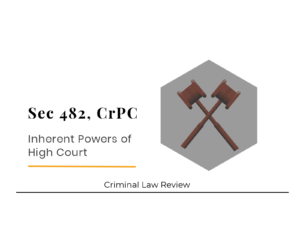Administrative Action Of Public Authority Cannot Be Invalidated Merely For Not Recording Reasons When It Had No Duty To Do So
Case: National Highway Authority of India vs Madhukar Kumar
Coram: Justices KM Joseph and S. Ravindra Bhat
Case no.: CA 11141 OF 2018
Court Observation: “Undoubtedly, in India, every state action must be fair, failing which, it will fall foul of the mandate of Article 14. It is, at this juncture, we may also notice that the duty to give reasons, would arise even in the case of administrative action, where legal rights are at stake and the administrative action adversely affects legal rights. There may be something in the nature or the context, under which, the administrative action is taken, which may necessitate the authority being forthcoming with rational reasons. There are other decisions, which essentially belong more to the realm of executive policy-making, which ordinarily may not require the furnishing of reasons.”
Persons, who may have a right or an interest, would know, what are the reasons which impelled the Administrator to take a particular decision. Judicial review, in India, which encompasses the wide contours of public interest litigation as well, would receive immeasurable assistance, if the reasons for particular decisions, are articulated to the extent possible. The giving of reasons also has a disciplining effect on the Administrator. This is for the reason that the reasons would capture the thought process, which culminated in the decision and it would help the Administrator steer clear of the vices of illegality, irrationality and also disproportionality. Reasons could help establish application of mind. Conversely, the absence of reasons may unerringly point to non-application of mind. The duty to act fairly, may require reasons to be recorded but the said duty, though there is a general duty on all state players to act fairly, may have its underpinnings, ultimately in legal rights.
It is one thing to say that there should be reasons, which persuaded the Administrator to take a particular decision and a different thing to find that the reasons must be incorporated in a decision. The question, relating to duty to communicate such a decision, would arise to be considered in different situations, having regard to the impact, which it, in law, produces. In fact, the second proviso to Rule 17 of the Rules, provides not only for there being reasons, but the reasons for refusal to permit barricades, must be communicated. If the law provides for a duty to record reasons in writing, undoubtedly, it must be followed and it would amount to the violation of the Statute, if it were not followed. Even if, there is no duty to record reasons or support an order with reasons, there cannot be any doubt that, for every decision, there would be and there must be, a reason.
The Constitution does not contemplate any Public Authority, exercising power with caprice or without any rationale. But here again, in the absence of the duty to record reasons, the court is not to be clothed with power to strike down administrative action for the mere reason that no reasons are to be found recorded. In certain situations, the reason for a particular decision, may be gleaned from the pleadings of the Authority, when the matter is tested in a court. From the materials, including the file noting’s, which are made available, the court may conclude that there were reasons and the action was not illegal or arbitrary. From admitted facts, the court may conclude that there was sufficient justification, and the mere absence of reasons, would not be sufficient to invalidate the action of the Public Authority. Thus, reasons may, in certain situations, have to be recorded in the order. In other contexts, it would suffice that the reasons are to be found in the files. The court may, when there is no duty to record reasons, support an administrative decision, with reference to the pleadings aided by materials.
[doc id=10215]
Previous Posts
Burden Of Proof In Departmental Proceedings Is Of ‘Probabilities Of Misconduct’: Supreme Court
Educational Qualification A Valid Ground For Classification Between Persons Of Same Class In Matters Of Promotion: Supreme Court Download Judgement




